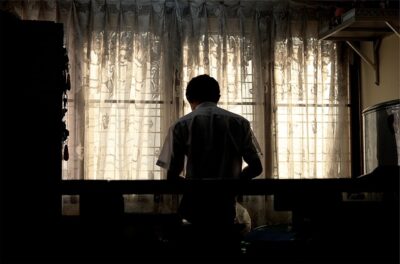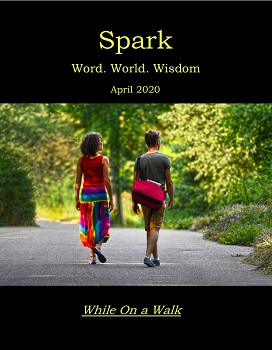by Santanu Das
College campus life is at once precious and homely,
and the suspension of classes due to the Covid pandemic has affected the mental
health of many students. Santanu Das tries to articulate his despair and his attempt
to seek solace in hope.
During lunch the other day, Ma said that perhaps I won’t be able to attend university classes anymore. Her words were sudden, with an understated assertion to them, as if it was natural and there was nothing left to be considered about it. It struck me so hard that moment, that I couldn’t help but look at her in anger. How could she so easily voice my fears without an iota of feeling? For indeed, it is turning true, yes. My last semester of postgraduate studies at Jadavpur University hangs without any certainty of completion, now that the period of lockdown in the wake of COVID- 19 has been extended till June 10. If there’s anything I am holding on to in all this chaos, it is hope. Hope that after the lockdown ends, I will still be attending the last few days of university classes.
I’ve been at home for over a month now, something that has happened after many years. For high school, I left home to study at Chandannagar, near Howrah. Shortly after, I joined Banaras Hindu University for my graduation programme. But this time, it was different than just staying away from home. The hostel where I stayed for the entirety of my graduation was far from homely, expectedly. In the initial days, I struggled to fit in – everything felt new, including the food and language, and I was overwhelmed with many changes at once. Slowly, as I grew accustomed to the place, I grew fond of the campus, and felt myself craving to return to my hostel during vacations at home. Perhaps it was the lush campus, or my group of friends, or just the allure of the city itself, which made me forget home. I realised that I was always chasing the idea of home as a place, as a form of shelter, without noticing that home was quite simply just an idea itself. An idea of home, where I could be comfortable and free.
Three years flew like a dream, but it was all turned upside down at the very end with the passing away of my close friend. By then, I had taken admission in Jadavpur University for my postgraduation. Every inch of me was hopelessly uprooted by his sudden death, shattered at the very unfairness of death itself. This incident upturned the entire experience of the past three years, and each anecdote from college life felt like the opening of a deep wound.
Upon starting my postgraduation, I travelled to Jadavpur from home and back every day, a two-hour journey by bus and train, something that made me physically and emotionally wrung out. It was unbearable, the crowded spaces in public transport and desperation pasted on every face. Eventually I took a room near Jadavpur University, away from home yet again. This time, it didn’t feel strange at all, maybe because I was conscious of my choice to find a space away from home, where I could recuperate in my own flow. This time I was not chasing any idea of home, but trying to immerse myself in another space altogether. Over time, I found myself in the Jadavpur campus; it was a space where newly-made friends sat on railings and staircases, and sang songs from neglected poems. There was smoke all around, in balconies and on graffiti walls, even in people’s words. Never for a moment did this campus feel like home, but the strange energy with which I found myself enmeshed felt nice. My room became a space to unwind and rest, with a rare sense of calm away from the chaotic campus. And perhaps it was this chaotic campus, coupled with the resounding silence of my room, which helped me recover. I made more friends, fell in love, and tried to let go of the past that had left such a sour taste. The university campus tapped into a part of me that I never knew existed – that of hope. I returned home on Fridays and went back on Sundays. This was the cycle, cut short at the very end, with the disastrous rise of Covid as a global pandemic.
Once again, I find that at the very end of a journey, everything suddenly crashes. It feels like a cycle, an unforgiving reminder of forces that operate beyond my reach, without a warning. Without a set structure, saddled with the uncertainty of the present and paranoia for the future, final year students have to face an unspeakable amount of emotional and mental distress. This is coupled with the acknowledgement of privilege that education itself reflects in a time like this, when so many citizens are dying of hunger, without a home to protect themselves. This sensibility serves to negate individual despair at the cost of a wider, more collective sense of trauma. What do we do at this point in time, to provide ourselves with a sense of optimism? The tide turns each new day, with mounting numbers of infections and deaths. For me, this time, death seems to be everywhere, in the collective consciousness. There is fear and anxiety, and an overwhelming sense of helplessness. With the lockdown extended to stave off a pandemic, this is also a humanitarian crisis. Where can one seek solace?
For me, the answer rests in hope alone. Everyone is trying to survive this in their own way. I see students of my university running a community kitchen to help the daily wage workers of the area. I see a collection drive for our favourite Bhootnath Da, who runs the photocopy shop in our department. I see songs, and artwork, and poetry all over social media, a vibrancy of effort and skill on display. All of this happens alongside the unease and discomfort friends describe, about how being at home feels. Now, more than ever before, I truly see how the university campus is nothing short of a second home for so many students like me, coming from near or far. I see a communion of souls, holding on to each other, reaching out whenever there is distress. It is in this reaching out to another being that I draw hope from, every single day. A hope born out of physical distancing, lived in a shared concern. It is this hope that fuels me to attend online classes where professors candidly speak of debunking insecurities for the greater good. When I speak of hope, I speak for so many of these students like me, bound within the walls of their homes, tired of counting days and trying to distinguish one night from the previous one. Hope is the watchword that seeps through every conversation with friends, along with filtered Instagram stories from last year, on campus, bringing back memories of what time did to us. Hoping is the only way out, a necessary dose of positivity that keeps the tide flowing.
So at home, even when Ma underlines my growing fears in her sudden realisations that my time as a student will be cut short, I hope for the better. By the time I finish lunch, the only time when everyone tries to remain silent, like a collective prayer, I travel through the campus in my dreams. I take a walk through the paved roads that feel more like home now than home itself, hopeful that life will give us another chance to meet on campus after the lockdown ends. That there will be a fitting goodbye to this journey. Even in this uncertainty, I truly believe that there is hope at the end of this dread, so I would rather hold on with sustained breath to recount how we stayed together, physically apart and yet united in hope.
Santanu Das is a final year postgraduation student in the Department of English, Jadavpur University. Forever saving places through capturing them in photographs, he loves everything that echoes poetry and jazz. Scared of unexpected deaths, he is vocal about coming into terms with depression and mental health issues. He aspires to become a teacher and adopt a kid.






